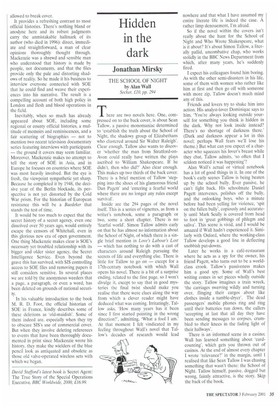Hidden in the dark
Jonathan Mirsky
THE SCHOOL OF NIGHT by Alan Wall Secker, £10, pp. 294 There are two novels here. One, compressed on to the back cover, is about Sean Tallow, a passive monomaniac determined to `establish the truth about the School of Night, the shadowy group of Elizabethans who clustered around Sir Walter Raleigh'. Clear enough. Tallow also wants to discover 'whether the man from Stratford-onAvon could really have written the plays ascribed to William Shakespeare. If he didn't, then who did?' Also clear enough. This makes up two thirds of the back cover. There is a brief mention of Tallow 'stepping into the shoes of his glamorous friend Dan Pagett' and `entering a fearful world where there are no longer any rules except survival'.
Inside are the 294 pages of the novel itself. This is a series of vignettes, as from a writer's notebook, some a paragraph or two, some a short chapter. There is no 'fearful world'. Simon Tallow admits early on that he has almost no information about the School of Night, of which there is a single brief mention in Love's Labour's Lost — which has nothing to do with a cast of characters around Raleigh pursuing the secrets of life and everything else. There is little for Tallow to go on — except for a 17th-century notebook with which Wall opens his novel. There is a bit of a surprise ending, related to the first page, so I won't divulge it, except to say that in good mysteries the final twist should make you realise that there were clues along the way from which a clever reader might have deduced what was coming. Irritatingly. Tallow asks, 'How many years has it been since I first started pointing in the wrong direction?', admitting, 'What a fool I am.' At that moment 1 felt vindicated in my feeling throughout Wall's novel that Tallow's decades of research would lead
nowhere and that what I have assumed my entire literate life is indeed the case. A rather limp denouement, I'm afraid.
So if the novel within the covers isn't really about the hunt for the School of Night and Who Wrote Shakespeare, what is it about? It's about Simon Tallow, a literally pallid, uncombative chap, who works stolidly in the BBC News Department from which, after many years, he's suddenly fired.
I expect his colleagues found him boring. As with the other semi-disasters in his life, some of them with women who rather like him at first and then go off with someone with more zip. Tallow doesn't much mind any of this.
Friends and lovers try to shake him into action. His analyst-lover Dominique says to him, 'You're always looking outside yourself for something you think is hidden in the dark. Why not look inside instead? There's no shortage of darkness there.' (Dark and darkness appear a lot in this novel; perhaps Wall fears we'll lose his theme.) But what can you expect of a character who squeezes his lover's breast while they chat, Tallow admits, `so often that I seldom noticed it was happening'?
Alan Wall's actual or virtual notebook has a lot of good things in it. In one of the book's early scenes Tallow is being beaten up by the school bully. Ever passive, he can't fight back. His schoolmate Daniel Pagett intervenes, polishes off the bully, and the onlooking boys, who a minute before had been yelling for violence, 'spit on the fallen bully', copiously and accurately until Mark Scully is covered from head to foot in `great gobbings of phlegm and saliva'. This scene is vivid, and I would be amazed if Wall hadn't experienced it. Similarly with Oxford, where the working-class Tallow develops a good line in deflecting snobbish put-downs.
Later he works in a café-restaurant where he acts as a spy for the owner, his friend Pagett, who turns out to be a worldclass crook. Tallow's passiveness makes him a good spy. Some of Wall's best writing comes in set pieces wholly outside the story. Tallow imagines a train wreck, 'the carriages swerving wildly and turning over, flinging their cargos about like clothes inside a tumble-dryer'. The dead passengers' mobile phones ring and ring until their batteries run down, the callers 'accepting at last that all day they have been sending messages to corpses, crumbled to their knees in the fading light of their hallways'.
There is an informed scene in a casino; Wall has learned something about 'cardcounting', which gets you thrown out of casinos. At the end of almost every chapter I wrote 'relevance?' in the margin, until I realised that like Sean Tallow I was chasing something that wasn't there: the School of Night. Tallow himself, passive, dogged but wrong, faintly attractive, is the story. Skip the back of the book.


























































 Previous page
Previous page